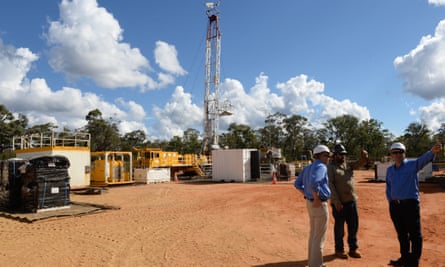Extract from The Guardian
Last modified on Fri 25 Sep 2020 03.57 AEST
The National Farmers Federation has urged the Morrison government to tread carefully with its “gas-led recovery”, declaring farmers need to be in control of their land use, and the security of groundwater needs to be paramount.
While the gas push was crafted in part by the Coalition’s business advisers, and business has largely welcomed the government’s signalling about increasing the supply of gas for domestic use, the NFF will lobby the government to make sure the plan does not involve a significant expansion of coal seam gas projects.
The NFF’s chief executive, Tony Mahar, told Guardian Australia “farmers should have choice in determining his or her own priority with how private land is used through a respectful and transparent process”.
“Farmers have and will continue to advocate that any extractive development must not impede on quality of agricultural resource, whether land or water,” Mahar said.
“Any development must recognise the importance of local community buy-in, noting their deep knowledge of issues, challenges and opportunities for prospective projects.”
Mahar said security of groundwater and other water sources, and protection of prime agricultural land remained of “paramount importance to farmers and there are major concerns with any activity that could pose a risk to the precious Great Artesian Basin, to locally important aquifers and other water sources”.
Renewed pressure from farmers could revive tensions between the Liberals and the Nationals. NSW Farmers has already voiced its opposition to the controversial Narrabri coal seam gas project, which the Morrison government is championing on the basis that it will increase the supply of gas in the state, and lower prices.
The state affiliate of the NFF says Narrabri poses an “unacceptable risk to the water resources, soil and air quality, local food and fibre production and rural communities in western New South Wales”.
Morrison has listed Narrabri as one of 15 projects of national significance, promising an accelerated assessment under federal environment laws and the energy and emissions reduction minister, Angus Taylor, has suggested it will reduce energy costs for consumers. But coal seam gas developments remain controversial on the ground, creating divisions in regional communities.
Mahar said farmers were not opposed to gas as a transitional fuel. He noted that gas could be used to firm power generation from renewable sources “particularly as coal-powered generation goes offline”.
But the NFF chief also noted that gas was not the only firming solution on offer. There were viable alternatives, such as battery storage, pumped hydro, and in the future, hydrogen.
Mahar noted that farming was currently heavily reliant on liquid fuels, such as diesel, and he said gas would help with the transition to electrification and hydrogen-based energy systems for rural and remote places.
The NFF, with other business groups, has signed on a net zero target by 2050, and Mahar said anyone who was “serious” about net zero emissions needed to create a pathway to replace liquid fuels.
“The cost and availability of gas is also important for regional energy costs, particularly for our regional manufacturers and processors,” he said.
“Gas is a very important input into the production of farm inputs, such as fertilisers and is a crucial factor in value adding and competitiveness of Australia’s food and fibre supply chains.”
“Gas also plays a key role in the establishment of a hydrogen supply chain. If we are genuine about a net zero emissions target, hydrogen is going to be the key enabler to transition away from liquid fuels such as diesel.”
The Morrison government this week unveiled its technology roadmap, which is the Coalition’s new policy framework for long-term emissions reduction. One of the technologies the government is championing is hydrogen.
Labor has dubbed the roadmap the “road to nowhere” because it is a long-term emissions reduction strategy without concrete emissions reduction targets after 2030.
The Morrison government is continuing to resist pressure to sign up to a target of net zero emissions by 2050 – a concrete and increasingly uncontroversial abatement target that is supported by business and community groups, and is consistent with the obligations the government adopted under the Paris agreement.

No comments:
Post a Comment